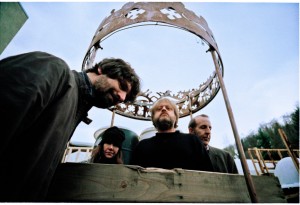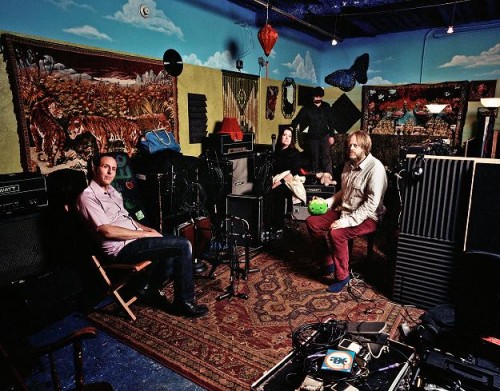“KINSKI IS A BAND [that is] perfect for driving. Perfect for driving on a freeway that goes on forever. Perfect for ripping up to the sky in your space shuttle. [Kinski is] a band about propulsion.”
–Ned Raggett, Allmusic.com contributor
Going further, Kinski exists outside of genre or label. Kinski takes you from the here-and-now to beyond and back, sometimes depositing you at another destination entirely. Kinski is your ride.
With unpredictability as the only constant, each song evokes a sense of exploration and adventure. Consider “Staring,” from the band’s 1999 debut, Space Launch For Frenchie. Opening with a dreamy, New Age melody accompanied by a swirling “wwwoossshhhh,””Staring” conjures images of afternoon spa treatments and hushed forests after a light spring rain. As the melody wafts and flows through your mind, you begin to relax, perhaps even nodding off. Then at 3:20: “WAAAAAHHHHH!!!”! A sonic assault rains down with thunderous abandon, lasting for about a minute-and-a-half before ebbing into a lovely alt-tuned rock chord progression reminiscent of Daydream Nation-era Sonic Youth.
Focusing on instrumentals, with the odd foray into vocals, Kinski’s song titles imply a contemplative counterweight to the heaviness of traditional rock. Examples: “Schedule for Using Pillows & Beanbags,” “Passed Out On Your Lawn,” “A Little Ticker Tape Never Hurt Anybody,” “Argentina Turner,” “Child Had to Catch a Train,” and “Punching Goodbye Out Front.”
“A lot of the song titles come from real things that happen[ed to us],” says bassist Lucy Atkinson. “[As an example] we were at a house party with a bunch of friends, and some guy was leaving and he was kinda drunk and saying his goodbyes and [he] ended up punching people—in a friendly way—but, he was ‘punching goodbye out front.’”
 Sometimes the song names become so complicated even the band members can’t remember them all, so they use simpler aliases during live performances. If you examine Kinski’s set list for any particular gig, you’ll need your “Little Orphan Annie Secret Society Decoder Pin” to determine what songs they will actually play. Some examples: “Argentina Turner” is “Argentina” live; “Child Had to Catch a Train” = “Not Argentina;” “Hot Stenographer” = “Groundhogs.” Precisely how these musical prodigies manage to keep it all straight strains the imagination.
Sometimes the song names become so complicated even the band members can’t remember them all, so they use simpler aliases during live performances. If you examine Kinski’s set list for any particular gig, you’ll need your “Little Orphan Annie Secret Society Decoder Pin” to determine what songs they will actually play. Some examples: “Argentina Turner” is “Argentina” live; “Child Had to Catch a Train” = “Not Argentina;” “Hot Stenographer” = “Groundhogs.” Precisely how these musical prodigies manage to keep it all straight strains the imagination.
Originally calling themselves the Klaus Kinskis, the band formed in 1998 over tall drams of whiskey in a dark Seattle bar. Chris Martin (guitar) and Atkinson had been discussing the merits of analog versus digital recording, unaware that bartender Dave Weeks had been listening intently. “And he just sat down right next to us, in the middle of our conversation and just started chiming in and said, ‘I’m a drummer.’ Then we just kinda went from there,” Atkinson recalls.
Martin, the band’s songwriter, had been listening to a lot of ’70s German rock, aka Krautrock, and writing ambient-style instrumentals, leading to Frenchie’s arrival the following year. Shortly thereafter, Matthew Reid-Schwartz joined as a second guitar player (he also plays flute and keyboards), and the four-piece began to explore more of Martin’s textured soundscape compositions. Reid-Schwartz proved a creative catalyst, inspiring a dynamic, fluid guitar interplay with Martin, catalyzing a freewheeling new improvisational approach at their live shows.
The band’s evolution continued with 2001’s Be Gentle With the Warm Turtle, where Kinski experimented with alternate guitar tunings combined with more traditional beats. “Newport” stands out as a highlight of this era, distilling the pace to a driving 4/4 with Martin adding a rare vocal. Barrett Wilke, who replaced Weeks on percussion shortly after that record came out, favors a grooving, stripped-down backbeat, despite a mind-bending capacity for complex time signatures. “The fact that [the beat is] consistent, really make[s] the band sound more powerful,” says Wilke. “I’ve worn out my stacks of [King Crimson’s] Bill Bruford-style prog rock stuff. And I love that stuff, but [Led Zeppelin’s] John Bonham is somebody that I always kinda come back to. You know, [I’ll ask myself] ‘What would John Bonham do?’”
Kinski’s ambitious songwriting, not to mention their unbridled eccentricity, drew the attention of Sub Pop Records, the hallowed Seattle label credited for underwriting the grunge revolution and for giving pioneers like Nirvana, Soundgarden, and Mudhoney their starts. The marriage with Sub Pop spawned two landmark records: 2005’s Alpine Static and 2007’s Down Below It’s Chaos. Static represents the culmination of the band’s ethereal instrumentals, crowned by the nearly eight-minute opus, “The Party Which You Know Will Be Heavy.” Beginning with a quiet, hypnotic guitar line, “Party” adds bass and soft, meditative percussion, slowly building to an explosive rock climax. As the guitars intertwine amid a wailing psychedelic crescendo, the band suddenly stops—as in complete silence. As you examine your iPod for defects, weird random noises emerge for several seconds. Then, “BAM!” A driving riff-rocky wall of noise crashes through your speakers and builds and swirls for a couple of minutes until transitioning into a pretty, but slightly off-kilter chord sequence. Similar to classics like the Beatles’ “You Never Give Me Your Money,” “Party” begins in one place and ends up somewhere else. “We do that a lot,” says Atkinson. “….And that section….the whole ‘when it stops and goes’—that whole part of that song is totally completely improv. Every time we play it different[ly live].”
“That’s one of our more successful long pieces, I think,” Martin adds. “And that song took a couple years, actually, of working on it and then just setting it aside.”
Chaos signifies a major shift away from esoteric soundscapes and toward a hardened and somewhat unexpected biker-rock vibe, without completely jettisoning the band’s experimental approach. An entirely different Kinski emerges on “Crybaby Blowout,” a 3 ½ minute instrumental displaying a grinding, repetitive riff. A similar aesthetic drives much of this record, particularly with other short riff-heavy based numbers like “Child Had to Catch a Train” and “Dayroom at Narita Int’l.” The band still remains true to its avant-garde roots, however, with the multi-part instrumental “Plan, Steal, Drive,” which offers a dreamy intro followed by a sort of “biker meets chainsaw operator meets Black Sabbath” minor chord progression. One critic even described Kinski’s music as ‘Sonic Youth combined with Black Sabbath,’ a conclusion perhaps arrived at after hearing Chaos. “If you need a reference point, I think we’re happy with those two [bands] for sure,” says Martin.
Riffs on Chaos, particularly with “Crybaby” and “Train,” tap into the syrupy fuzz of grunge-era sludge, albeit deeper and even heavier. “A big part of [our sound derives from] volume,” says Martin. “The open tunings help, too. When you tune the strings down [combined] with a loud volume, it gives a real harmonic, kinda sonic sustain.”
Martin found himself at an artistic crossroads after Chaos, unsure of where to take the band musically. A big fan of the seminal indie pop/rock band Guided By Voices, Martin tried his hand at writing shorter songs in a more traditional verse-chorus-verse format. Unfortunately, his new compositions didn’t seem to fit Kinski. “I wrote a bunch of those [kinds of songs] for [our next] record,” he says, “but a lot of ’em didn’t work with the band. So we had a whole record ready to go, of [new] material, but we threw all that out after we toured and tried some of it out live. And we were just like, ‘Oh, this isn’t right.’ That’s one reason [the next] record took so long.”
After a six-year hiatus, the band released Cosy Moments this past April on Kill Rock Stars, the Northwest label known for championing the “Riot Grrrl” movement of the ’90s, with bands like Bikini Kill and Sleater-Kinney. Cosy Moments showcases even shorter songs. For example, the Mudhoney-esque “Last Day on Earth” clocks in at 1:41, and the grungy but poppy “Let Me Take You Through My Thought Process” ends after just 1:21. The band continues with its off-the-wall song monikers, though, notably “Riff DAD” (named after the alt tuning known as DADGAD) and, my personal favorite, “Skim Milf.” “Chris came up with that [title],” says Reid-Schwartz. “I mean, I have kids. [laughs.] But, it’s just sort of like, ‘How can you say no to a title like that?’”
“[Cosy Moments is] not only similar to their old stuff, but it’s got [more vocals],” says Kill Rock Stars owner Portia Saban. “And Chris can really sing. And it’s fun, and funny and it has a sense of humor. The music itself really caught me a little bit by surprise, because it’s a little bit different than what they had been doing in the past.”
Martin seems dissatisfied, though, not necessarily with the record, but in an artistic way. As strong as Cosy Moments is, the record feels transitional, perhaps leading to Kinski’s ultimate statement. “What I’m trying to get [to]…is sorta be able [to] combine the soundscapes with the songwriter [approach and] riff styles,” says Martin, “and try to make that as seamless as possible. That’s kinda the end goal, I think.”
Regardless of what happens on Kinski’s next record, prepare yourself for another ride into the breathtakingly unexpected.
Note: Kinski finished up a West Coast tour in Seattle earlier this month. The band plans on a European jaunt this fall. Check their website, www.Kinski.net or their Facebook page for updates.
http://open.spotify.com/user/joed_sandiego/playlist/5gqBMa3NSg9vlRx0JwSkaT




Pingback: Kinski: My Latest Seattle Band Crush | the strangest tribe
Pingback: » New feature up Kinski